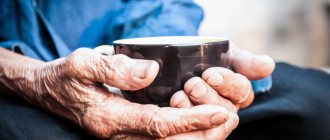Many people drink at least 2-3 cups of coffee a day. Previously, the drink was considered harmful, but in recent years scientists have found a lot of evidence that coffee is good for the body, prevents the development of many diseases, helps to lose weight, etc. In addition, in the modern rhythm of life, it helps to focus, concentrate, work and live more actively. But how much can you drink without harm, can you be poisoned by coffee and what kind, and what to do if the dose is too high? How to recognize the symptoms of coffee poisoning?
Can you get poisoned from coffee?
You can be poisoned by anything, and coffee in this case is no exception. True, this option is unlikely. This is usually closer to an overdose rather than actual poisoning, since coffee, as a rule, does not contain poison. There is an individual reaction to individual components, as well as exceeding reasonable consumption standards when too much caffeine enters the body.
Doctors report that most cases of caffeine poisoning occur as a result of taking stimulant pills and energy drinks, not from the coffee itself.
However, you can still get poisoned, especially in the following situations:
- If you have drunk too much coffee. A lot in this case is a subjective concept, but definitely more than you usually drink. Exceeding the dose by just one or two cups can lead to unpleasant consequences, especially if you are not used to such doses.
- If the body is weakened, the person has not had enough sleep, or is in a state of stress, the likelihood of coffee poisoning is much greater.
- If you drink coffee on an empty stomach, especially in situations where the body is weakened.
The measure is different for everyone
According to scientists, addiction to coffee and susceptibility to its main component are determined by genes involved in caffeine metabolism.
In other words, how much coffee you can drink per day without harm to your health depends on the body’s tolerance to the alkaloid.
Remember the “record” of the creator of great novels described at the beginning. Trying to approach it, the vast majority of amateurs will leave the race after 6 cups, feeling a surge of heat and dizziness. The seventh portion will lead to visual or auditory hallucinations and other signs indicating an overdose of coffee.
But for small fans, their health may deteriorate after the first tasting of a very strong drink.
From 10 cups of coffee, ≈1 g of caffeine enters the body - a dose that causes intoxication.
Serious consequences, even death, are possible if you drink a lot of coffee in the presence of cardiovascular pathologies, alcohol intoxication, conditions associated with acclimatization or rapid change of time zones.
The caffeine concentration sufficient to kill is ≈150-200 mg per 1 kg of weight.
Based on this, the lethal dose of coffee varies, depending on body weight and caffeine sensitivity, within the range of 60-100 cups of drink per day.
Such calculations are rather arbitrary, since they are based on the pharmacological action of “pharmacy” caffeine, a water-soluble bitter powder obtained from plant raw materials.
In fact, it is almost impossible for people who do not have chronic diseases to die from coffee:
- To achieve a lethal concentration of the alkaloid, you should “swallow” 60-80 cups of coffee = 12-16 liters of liquid over 2-4 hours. The body will “protect itself” from excessive amounts of fluid and increasing intoxication by vomiting.
- Tannins from coffee beans “bind” the mucous membranes of the gastrointestinal tract, making them less permeable. The components of the drink stop being absorbed.
- Thanks to the diuretic effect and stimulation of peristalsis, all excretory systems will work in “emergency mode”. Severe diarrhea is unlikely to motivate you to continue the “experiment.”
However, each “extra” portion of it negatively affects heart rate and blood pressure, provokes constipation and even changes the level of hormones responsible for ovulation and fertilization.
What happens if you drink a lot of coffee at once, and how painful does systematic abuse “hit” your well-being?
Poisoning with natural and instant coffee
Natural coffee poisoning usually occurs due to an overdose. As an option, if a person usually drinks a weak instant drink, and then decides to drink a large cup of a strong natural one.
It is much easier to get poisoned with instant coffee. It is processed chemically, and the finished powder or granules usually contain up to 15-20% of the original grains. The rest is stabilizers, preservatives, emulsifiers, dyes, starch, synthetic additives, etc. The cheaper instant coffee is, the more dangerous it is to drink, since there is less and less natural product and more and more chemicals.
Decaffeinated coffee is also unsafe. Caffeine is washed out with chemical solvents, which are also present in minimal doses in the finished product. If the coffee is instant, it also contains all the dyes and preservatives described above.
Most often, people get coffee poisoning due to an individual reaction to artificial components or a combination of them. Therefore, you should not get carried away with an instant drink from an unknown brand if you are prone to allergic reactions or have diseases of the cardiovascular system.
You can get poisoned if you usually drink coffee with milk and suddenly drink black coffee.
What to do if you overdose on coffee
Let's say you have discovered several of the symptoms described above in yourself or your friends. What to do if you overdose on coffee?
To drink a lot of water.
Coffee causes dehydration, so the first thing to do is drink plenty of water. If the symptoms of dehydration are too severe, or diarrhea is added to them, you can add a little salt to the water. It will delay the removal of fluid. Experts say that for one cup of espresso you should drink at least 1 glass of water. Please note that the traditional oriental coffee recipe includes serving coffee with water, since after a very strong drink it is necessary to restore the water balance in the body.
Eat a banana.
As experienced baristas say, bananas perfectly relieve tremors and feelings of internal tension. Most likely, this is explained by the fact that bananas contain a lot of potassium, which has a very beneficial effect on the cardiovascular system.
Come out for air.
An influx of oxygen and a slow walk will be beneficial if the overdose of coffee is mild, and manifests itself in redness of the face and mild dizziness.
Lie down and open the window for fresh air.
This measure is suitable if you experience a feeling of weakness, nausea and dizziness. Water and a couple of bananas will complete the relief of symptoms.
In severe cases, if the skin turns blue and the person feels unwell, it is necessary to induce vomiting, then drink large amounts of water. If the symptoms do not subside, then you need to go to the doctor.
If a person has lost consciousness, then it is necessary to call an ambulance, and before it arrives, make sure that the victim has access to air.
A slight overdose of coffee often occurs at friendly gatherings, in small cafes or bars, where there is little space, a lot of people and strong coffee. To avoid unpleasant consequences, drink more pure still water, order yourself extra citrus juice and a few bananas. Be attentive to yourself and only enjoy your favorite drink.
Symptoms of coffee poisoning
The first symptoms usually appear within 5-10 minutes after drinking your favorite drink:
- The face turns red from the rush of blood;
- The eyes sparkle;
- Feeling dizzy and weak;
- Heat is felt in the body, it can be sharp or increase gradually;
- The body or limbs may tremble, individual muscles or eyes may twitch;
- The heart beats faster and faster, pain may be felt;
- Breathing is shallow and it can be painful to inhale.
With prolonged intoxication of the body or stable consumption of large amounts of coffee, the following symptoms may occur:
- Nausea or vomiting;
- Stomach upset, diarrhea, cramps;
- More frequent urination in small volumes;
- Body heat, increased sweating.
With a sudden overdose of caffeine (usually from pills or energy drinks), acute phase symptoms may appear:
- The face turns sharply blue, especially around the lips and lips, the area under the eyes;
- Convulsions appear;
- Sticky cold sweat;
- Excessive nervousness or nervousness;
- Hallucinations and delusions.
How much coffee can you drink?
Doctors cannot say the exact amount of coffee that will be safe for human health. The fact is that caffeine affects everyone differently. Someone can drink quite a lot of this drink, but feel good, but for others, even 2 cups is too much. The physical condition of a person also influences this. If he is weak or unhealthy, his coffee intake is reduced. With active physical activity it can be increased.
It is impossible to say exactly how many cups of coffee you can drink without risking poisoning, since there are many types of this drink. Doctors believe that a safe dose of caffeine (at one time) is 100–200 mg of caffeine. Therefore, the recommended dose is 2-3 servings of coffee per day, for the preparation of which no more than 3 teaspoons of natural ground coffee or 2 teaspoons of instant coffee were used. US scientists have conducted research and proven that you can drink only 2-3 cups of coffee per day, the volume of which does not exceed 225 ml.
Doctors say that a person can have up to 25 cups of natural coffee or 15 cups of instant coffee . If you exceed this dose, caffeine poisoning will occur. However, this rule does not always work. Honore de Balzac, a famous writer, drank up to 50 cups a day. And Robbie Williams drinks 36 cups of coffee a day.
An overdose of coffee affects the human condition
How to deal with coffee poisoning?
The list of actions depends on what stage the person is in and how much coffee he drank:
- In the initial stage, if you feel sick 5-10 minutes after a cup of coffee, the best way to cleanse the body is vomiting. You can drink a glass of warm water and also induce vomiting. Provide fresh air flow. If you feel dizzy and weak, lie down or sit down. Drink water and try to breathe deeply. Usually after 15 minutes everything goes away, you may want to sleep.
- For more serious poisoning, if caffeine has already been absorbed into the stomach, or you have drank a lot of coffee over the past 24 hours, milk and banana, fresh air, as well as sorbents - activated carbon or any analogues - can help. You should give up coffee for several days.
- In the acute stage, it is best to call an ambulance. There is no antidote for coffee, so in a hospital setting they usually lower the blood pressure, monitor the condition, and administer medications to help remove toxins faster and prevent a critical condition.
How to remove caffeine from the body
Drinking plenty of fluids will help solve the problem. When drinking a liter of water, you should artificially induce vomiting. In addition, it would be useful to take sorbents (Polysorb, Smecta or activated carbon).
There is no antidote that can completely neutralize the effects of caffeine. Medical institutions provide symptomatic therapy aimed at combating the consequences of exposure to the alkaloid. In this case, they resort to prescribing antipsychotics, morphine and the drug Pipolfen.
Coffee has many beneficial properties, but only if it is drunk in moderation. Abuse of aromatic drinks leads to poisoning and the development of addiction. Therefore, the permissible dosage should be strictly observed.
Conclusions:
- Natural coffee does not contain poisons, and you can only get poisoned if you exceed the usual dosage.
- Instant coffee often causes poisoning, since most of its composition is chemical components, to which there can be an individual reaction.
- Poisoning from one cup of coffee usually goes away within 15-20 minutes.
- If a person is very ill and the nasolabial triangle turns blue, it is necessary to call an ambulance.
- People usually don't die from coffee poisoning.
What happens if you drink too much coffee at once?
The level of caffeine in the blood does not decrease quickly, so it is better not to abuse it. Otherwise, an overdose of coffee may occur. Already 15 minutes after taking the drink, the first unpleasant sensations arise. They reach their peak after about an hour, and then begin to decline. Caffeine is eliminated from the body after drinking one cup in about 6 hours. The body's reaction to excessive consumption of an invigorating drink is different. It is sometimes difficult to predict because health problems can appear suddenly.
Lovers of the aromatic drink note that they sometimes experience unpleasant sensations: the heart begins to beat wildly (as if jumping out of the chest), dizziness appears, and cold sweat breaks out. The frightening symptoms, which usually disappear within 20 minutes of occurrence, are familiar to many coffee drinkers and indicate a coffee overdose.
First aid
If a person has an overdose of caffeine in excess in the body, he needs urgent help. What to do in this situation? If the signs of poisoning are not so strong, you need to drink a lot of water (up to 2.5 liters) and then induce vomiting. Do this until the rinse water becomes clear. Then take activated carbon. The patient needs to drink a lot. In half an hour or an hour he will feel better.
If excess caffeine in the body leads to poisoning, medical help is required. Urgent hospitalization is required, so call an ambulance immediately. Cleansing the stomach will no longer help, because caffeine is absorbed into the blood.
Before the doctors arrive, you can only alleviate the patient’s condition: take him out into the fresh air or open the windows, loosen his clothes so that he can breathe freely. He should not worry, so it is important to calm the poisoned person. No medications other than sorbents should be given.
Benefits of coffee for the body
A mug of this aromatic product, prepared at home or ordered in a cafe, fills you with energy and is a powerful psychostimulant that increases performance and improves activity. In addition, there are effects that can be used in the treatment of pathologies:
- Regulation of excitation processes occurring in the cerebral cortex.
- Increased blood pressure and heart rate.
- Increased gastric enzyme production.
- Mitigation of attacks of bronchial asthma.
- Removing toxins, which contributes to the treatment of alcohol or drug addiction.
- Reducing the risk of developing Alzheimer's disease.
- Prevention of ovarian, oral, liver cancer.
Such beneficial qualities appear when a person adheres to the norm and does not overdose.
Causes of coffee overdose
An overdose of a drink (coffee) can develop for various reasons.
Causes of overdose:
- Abuse of coffee drink during the day. Typically, this situation occurs among people engaged in mental work.
- Overdose of drugs that contain caffeine.
- Children and teenagers should not drink this coffee drink.
- It is undesirable to drink coffee together with alcoholic drinks or during a hangover.
We recommend: Chicken poisoning - first aid and treatment
The amount of coffee for a person with a weakened immune system is significantly less than the permissible dosage for a physically healthy person.











